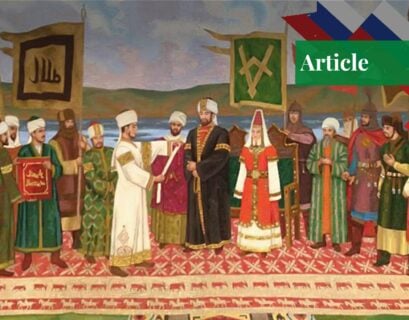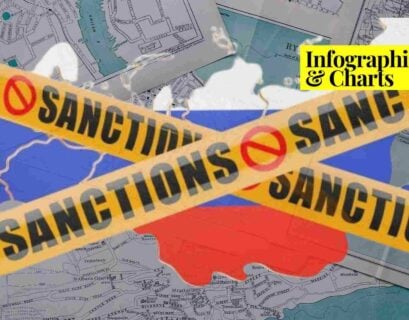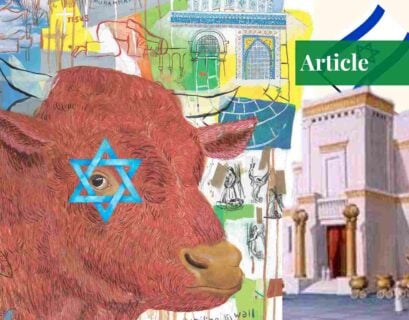Shared Russo-Israeli Demographics
Friendly relations and mutual cooperation between Israel and Russia (the former USSR) have been of considerable importance to both sides since over 150,000 Jews reside in Russia, with most of them concentrated in Moscow, whereas hundreds of thousands of Russian people have emigrated to Israel, with over 1.5 million of them being native Russian-speaking Israelis.
Israel is the world’s only country outside of the former Soviet states that is part-Russophone. For many years, Israel has served as a safe haven for Russian Jews particularly during ‘aliyah’ (the immigration of diaspora Jews towards the geographical land of Israel) from the Soviet Union during the 1970s and 1990s, despite the two countries being on opposite sides during the Cold War.
Israel-Soviet Union Ties
In 1941, following the German invasion of Russia, Joseph Stalin gave up on his staunch anti-Zionism position trying to rally global Jewish support for the Soviet war effort. During the war, thousands of Jewish refugees fled the Nazis to reach the Soviet Union, where they established their synagogues and began freely practising their religious activities.
Stalin began supporting a pro-Zionist foreign policy in late 1944, allegedly believing that the new country would be socialist and thus hasten the fall of British dominance in the Middle East. In 1947, the Soviet Union advocated the United Nations’ Partition Plan for the historical land of Palestine to be divided into two states, one Jewish and one Arab.
The Soviet Union formally recognised Israel on May 17, 1948, three days after Israel proclaimed independence. However, after the creation of Israel, Stalin reversed his pro-Zionist stance as he began favouring Arabs, arresting Jewish leaders in Moscow, and attacking the Soviet Jews.
The Soviet government formally cut off its diplomatic relations with Israel in protest of its policy and indiscriminate aggression during the 1967 Arab-Israeli war. The USSR provided weaponry and training to Israel’s Arab adversaries, and Soviet soldiers were deployed to Egypt during the War of Attrition (1967-70), where they frequently attacked Israeli forces.
Improved Israel-Russia Relations
Diplomatic relations were established between Israel and Russia in 1991, after 24 years of severed ties and the fall of the Soviet Union. As a small, globally isolated state, Israel has traditionally sought cordial ties with any interested partner. Israeli resistance to the NATO bombing of Yugoslavia in 1999 and support for IMF loans to Russia strengthened relations between the two states.
In 2000, with the election of the more pro-Israel Vladimir Putin, and in 2001, with the election of the more pro-Russian Ariel Sharon, who called Putin a “real friend of Israel,” did the relationship between Israel and Russia begin to improve significantly.
After coming into power, Putin sought to re-establish Russia as a significant stakeholder in the Middle East, working with all regional actors, whether traditional allies or adversaries. He based this approach on his assessment of furthering Russia’s interests and improving relations with the Jewish state that had been deteriorated by his pro-Arab predecessors.
Putin’s Policy on Israel
Several variables influenced Putin’s approach toward Israel, especially during his early years in power. One was Israel’s non-condemnation of Russia’s iron-hand policies and terrible human rights violations in the early 1990s in Chechnya, a breakaway republic in the North Caucasus. Another, more significant driver in Putin’s Israel policy involved his emphasis on developing economic ties in the Middle East.
He has correspondingly pursued trade with Israel, and the two countries have extended their collaboration in various fields as evidenced by agreements on space research in 2011, nuclear technology in 2013, and nanotechnology in 2014. Since 2016, discussions on a free trade deal between the Eurasian Economic Union – the Russian-led economic union initiative comprising Kazakhstan, Kyrgyzstan, Armenia, and Belarus – and Israel have been ongoing.
Overall, Russia-Israel trade increased to $1 billion per year by 2005, and more than tripled to $3.5 billion by 2014. In 2020, Russia’s net exports, including wheat, diamond, and coal, to Israel reached $1.01 billion. Similarly, Israel exported products including vegetables and tropical fruits worth $718 million to Russia in 2020. Over one million native Russian speakers reside in Israel, which matters to the Kremlin as Putin has pledged to protect the interests and prospects of all ethnic Russians wherever they may be settled.
Furthermore, Putin has sought to strengthen the presence and position of Russia in the Middle East as it continues to engage in the peace process being a member of the Middle East Peace Quartet, hoping to replace the West and emerge as a significant power in global politics. Putin believes it is in Russia’s interests to offer peace and stability in the Middle East and in Israel.
Russo-Israeli Policies of Realpolitik
Russia and Israel’s respective strategic policies pursue a clearly interest-driven realpolitik. The two countries opt for pragmatic selective cooperation when there are shared interests, even if normative disagreements prevail. Both nations have a siege mentality, are led by a security-first mindset, and hold a predominantly military view of power.
As long as the other side’s interests do not conflict with their own security needs, Russia and Israel desist criticising each other’s activities or backing up criticism with actions. In 2014, the Russian annexation of Crimea was met with widespread global condemnation and sanctions. However, Israel adopted a neutral stance which angered not only the United Nations but the occupational power’s biggest and most ardent global supporter – the United States.
The favour was returned the same year as Russia supported Israel’s Operation Protective Edge which killed over 2000 Palestinian civilians, including hundreds of children, calling it Israel’s battle to protect its citizens. Putin has drawn analogies between Russia and Israel’s counter-terrorism efforts many times at different forums to signify the two states’ common goals.
In 2015, relations between Israel and Russia further improved as the Syrian government asked Russia for military intervention to support Assad’s struggling troops against rebel militant groups which allowed Israel to attack Iranian military equipment and installations. From September 2015 to July 2018, the Israeli Prime Minister and Russian President met nine times to discuss the situation in Syria and coordinate their actions to avoid accidental clashes.
Putin while describing Israel and Russia as “unconditional allies” said, “Russians and Israelis have ties of family and friendship. Our nations are united by common and often tragic pages in history.”
Differences and Complications in Russo-Israeli Relations
The relationship between Israel and Russia has been marked by many highs and lows as, despite considerable improvement in bilateral relations, significant differences persist. At Putin’s invitation, Hamas leaders visited Moscow in March 2006; Putin denied Hamas being a terrorist group, enraging Israeli authorities. Other key challenges for Israel have been Moscow’s support for Iran’s nuclear programme and arms trade with Syria, which it fears would end up in the hands of Hezbollah.
Despite Western and Israeli worries that this stance may help Iran in building a nuclear weapon, Moscow has continued to support Iran’s nuclear programme and provide weaponry to Iran and Syria through both covert and overt channels. Relations between the two states worsened in September 2018, when the Russian Defense Ministry blamed the Israeli military for downing a Russian aircraft after putting it in the line of Syrian air defence systems during an Israeli operation on Hezbollah sites in Syria.
Although Putin initially exonerated Israel, Russia proceeded to upgrade Syria’s air defences to the S-300 missile systems despite retaliation from Israel. Moscow denied Israel’s offer to negotiate through diplomatic channels and resolve the dispute with mutual consultation. This turn of events contributed to Israel reversing its neutral stance on the Russian annexation of Crimea in December 2018 as it voted against Russian aggression in the region at the United Nations. However, relations were restored after Israeli Prime Minister Netanyahu’s reconciliatory visit to Moscow in early 2019.
Tensions Escalate
Since the beginning of 2022, Russia’s attitude toward Israel became increasingly confrontational, criticising Israel for its military activities in Syria. In February 2022, Russia refused an Israeli request to remove electromagnetic interference from its Syrian air station on aircraft landing in Tel Aviv, further exacerbating tensions between the two states.
When Russia launched its offensive in Ukraine, Israel urgently attempted to craft a balanced foreign policy toward both Moscow and Kyiv. However, after five months of the conflict, neither side seems content as Ukraine has been requesting military aid from Israel, and Russia is enraged by the statements issued by Israeli authorities, particularly Prime Minister Lapid, condemning Russian aggression in Ukraine and equating them to war crimes.
Israel has renounced its mediation efforts between Russia and Ukraine to resolve the conflict. The heightened tensions are also in due part because of the annulment of the transfer of Alexander’s courtyard, a Russian compound, in the old city of Occupied Jerusalem to the Russian authorities as had been sanctioned by the former Israeli Prime Minister Netanyahu.
Following this, in May, representatives from the countries engaged in a public spat as the Russian Foreign Minister called the Ukrainian President Zelensky a Nazi and disregarded his Jewish beliefs by asserting that Hitler too had Jewish blood, adding on that the biggest antisemites are often Jews. The Israeli Prime Minister regarded his comments as unforgivable, racist, and outrageous, calling to stop using the Holocaust of the Jewish people for political point scoring.
According to the then Prime Minister Bennett’s Office, President Putin subsequently apologised for his foreign minister’s remarks over a phone call. In further developments, Russia shut down the offices of the Jewish Agency that were responsible for the migration of Russian Jews to Israel and allowed Jews in Israel with Russian origins to maintain close ties with their homeland.
It was established in 1989 and had helped hundreds of thousands of Jews to emigrate from the Soviet states to the geographical land of Israel under its right-of-return laws. So far this year, 17,000 Russians left for Israel, twice as many as last year. Israel has accused Russia of using the Jewish Agency as a pawn to settle domestic political rivalries, further alleging that the Russians are now fearing the transfer of bright minds from Russia to Israel.
Nevertheless, the agency’s closure has dealt a severe blow to the Israeli authorities as they are now scrambling to bring Russia to the negotiations table. As the crisis between Russia and Israel is escalating, it is not only because of Israel’s stance on the ongoing conflict in Ukraine but also the Jewish state’s continuing aggression in Syria, especially its attack on the international airport in Damascus on June 10 that disabled flight operations, followed by an attack on the Port of Tartus where there is a Russian naval base.
Russia condemned the attack and stated that it was preparing a resolution draft for the United Nations Security Council to condemn Israel’s attack on the airport as it resulted in the discontinuation of the provision of humanitarian aid to the conflict zone. Israel has defended these airstrikes by calling them part of its mission to prevent the transfer of weapons from Lebanon to Hezbollah and to discourage Iran’s nuclear ambitions.
On 5th and 6th August, the Israeli Defence Forces attacked multiple targets within Palestine, allegedly to kill Palestinian Islamic Jihad leaders resulting in the death of 44 Palestinians, including 15 children, and leaving over 300 wounded. Russia condemned Israel’s undue and indiscriminate aggression in the Gaza Strip and called for “maximum restraint” from both sides.
Being concerned about the further armed escalation in the Israel-Palestine region, Russia further called out Israel for its provocative actions that lead to retaliation from Hamas. Earlier, Russia accused Israel of using the conflict in Ukraine to avert the world’s attention from the Israel-Palestinian conflict as it condemned the US-supported Israeli occupation of the West Bank and Gaza Strip.
The Israelis responded by asking the Russians to explain their “special military operation” in Ukraine which is committing war crimes. In mid-July, President Putin made his first international trip outside the former Soviet states since the invasion of Ukraine as he visited Iran. Putin met with Iran’s President Ebrahim Raisi, the Iranian Supreme Leader Ayatollah Khomeini, and Turkish President Recep Tayyip Erdogan.
Whereas any leader’s visit to Iran draws the attention and criticism of Israel, a visit by a leader of a significant global power who has been alienated by the West, caused greater concern for Israel. While bilateral cooperation between Iran and Russia is not unusual, Israel is hoping for the scope of the relations to remain limited as both countries are vying for greater influence in Syria.
The West has termed this visit as a desperate measure, amid fears that this may lead to a coalition between the pariah states, which would pose a threat not just to Israel, but also to the United States.
Conclusion
Bilateral ties between Israel and Russia have been characterised by a dichotomy of cordial relations coupled with considerable disagreements on a number of regional issues. Their relations have evolved as both countries established their respective post-Cold War strategic agendas, as they engaged in trade and commerce, and cooperated over the conflict in Syria and other regional and global issues.
However, after almost three decades of prosperous relations and mutual cooperation, ties between the two countries are going downhill, especially since the Russian invasion of Ukraine.
If you want to submit your articles and/or research papers, please check the Submissions page.
The views and opinions expressed in this article/paper are the author’s own and do not necessarily reflect the editorial position of Paradigm Shift.



















